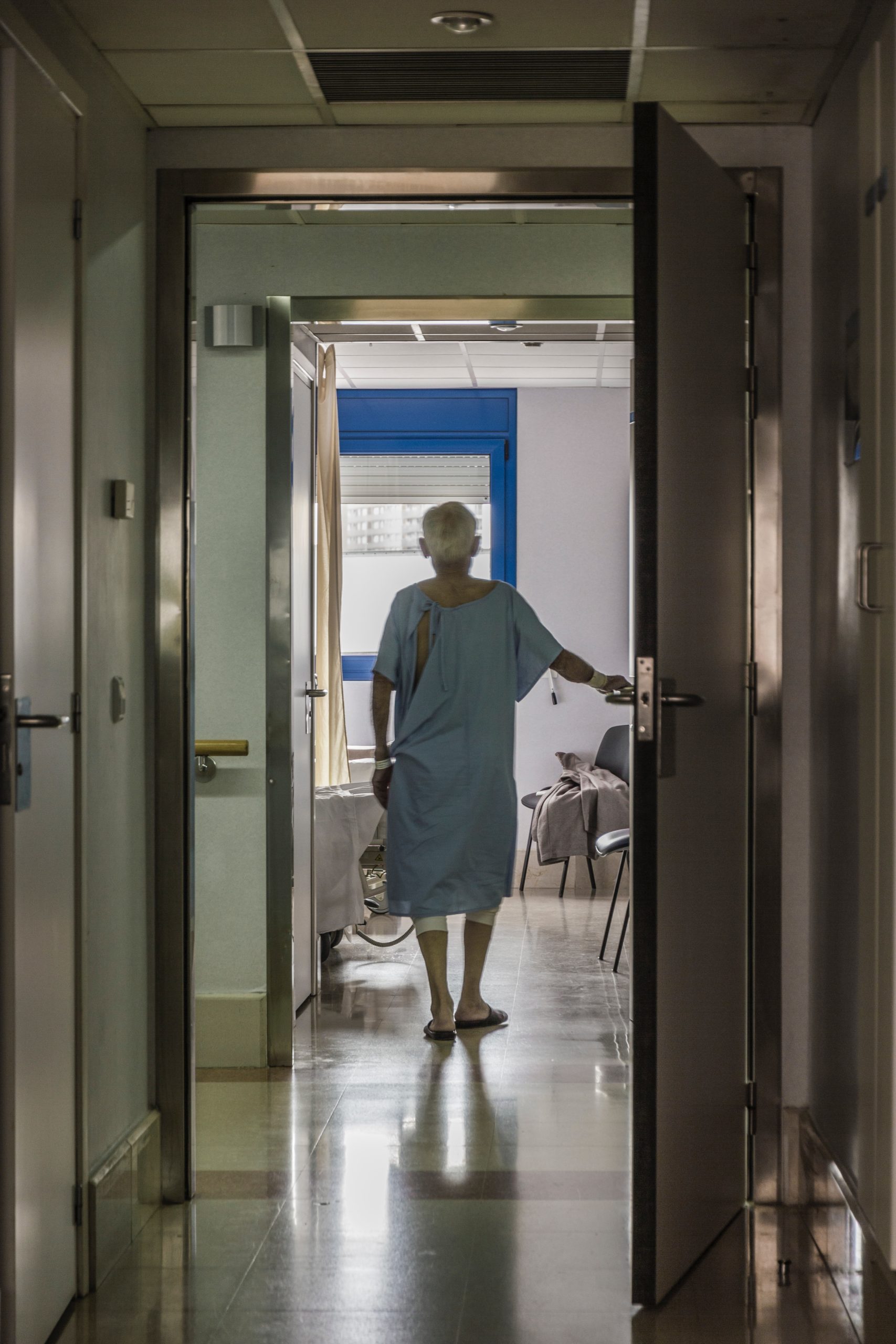
10 Signs of Approaching Death in Hospice
This article has been medically reviewed and edited by Dr. Martin Duggan in 2021.
This content is not intended to be a substitute for professional medical advice, diagnosis, or treatment. Always seek the advice of your physician or another qualified health provider with any questions you may have regarding a medical condition.
When a loved one is nearing the end of their life, you might find yourself looking for signs that death is approaching. While having 100% certainty is not practical, knowing the signs of when someone will die can make planning easier for those arranging or providing hospice services to a loved one.
Note: Hospice is a field where we can expect to see things that would never be considered normal in a healthy person. We will remind you that what follows would only be expected in someone who is actively dying. When we prioritize comfort in the face of death, we do so with the knowledge that the person for whom we are caring will die. If you ever have questions regarding the comfort of a loved one as death approaches, it is important to reach out to the doctor. Do not be shy. Just because the goals of care have changed, doesn’t mean our doctors forget about us. If anything, doctors understand better than others the need to make a person’s final moments comfortable.
1. Changes in appetite
As our bodies become ready for death, our desire for food decreases. Food often becomes less appealing and it may even appear disgusting. Watching a loved one refuse their meals is often one of the most difficult parts of the dying process to witness. We may feel tempted to encourage them to eat, but we should allow the body to prepare itself naturally for the dying process. When we can recognize that our loved one’s body is readying itself for death, it helps us to avoid taking offense when they refuse a meal we are offering.
2. Changes in thirst
Like with food, we may notice a similar decrease in a person’s desire to drink water. Our brains adjust our thirst response in order to prepare for death. During life, blood volume and electrolyte concentrations are the primary determinants of thirst. During our final moments, the ability to breathe comfortably supersedes all other concerns. Our lungs communicate to our brains that our ability to cough or remove fluids from the tiny regions of our lungs has faded. A part of the way our bodies compensate for this inability to keep our lungs clear from fluid accumulation is to keep things as dry as possible in our airway and in our lungs.
3. Changes in sleep
Another sign of approaching death is a change in the patient’s sleeping patterns. In our final days, we often become somnolent, and we may become more difficult to arouse. As we near our final moments, we may have our eyes closed in a deep sleep. Dying is a very tiring process for our brain. In order to make our bodies comfortable, our brains have sacrificed nutrition and energy production in favor of keeping our lungs and GI tract dry and at ease. Our brains compensate for this decreased energy supply by doing less. The portions of our brain not involved in breathing or regulating our heart become quiet – this is normal.
We may still respond in small ways to the world around us; grasping another person’s hand, or turning our ear towards someone whispering to us. Other times, our brain will focus on quiet breathing. Just because our loved one is not responding to us, doesn’t mean they stop loving us.
4. Confusion
In the days before death, our loved ones may experience confusion. If they began the dying process with dementia, then we may see a worsening of their symptoms. Gentle and loving reminders are the mainstay of treatment for these types of confusion. If your loved ones become severely distressed, you should ask the doctor about ways to help bring about calm. Often, medications may be necessary to help a confused person who is distressed, but this is not always the case. We should avoid any confrontation and try not to be mournful or angry. Once more, calm and quiet speech is essential.
5. Changes in vital signs
There are several ways in which a person’s vital signs may change as they approach death. Our blood pressure may drop. Our breathing and heartbeat may become irregular or hard to detect. Urine may become brown. Seeing these changes can be upsetting, but they do not have to upset us if we are prepared.
6. Changes in skin color
The skin is an organ, and like our other organs, it is affected by the dying process. When death approaches, the skin will allow blood elsewhere – to the lungs, the heart, or the brain. When this change happens, our skin color may change, resulting in paleness or appearing like marble with purple lines, which is called mottling. In the moments very near death, our skin may appear darker, gray, or bluish.
7. Changes in body temperature
In the time before we pass – usually, a small number of days in advance – our blood circulation slows and is diverted away from our skin. As we discussed above, this can cause changes to our skin’s appearance, but it may also cause us to become noticeably colder to the touch.
More rarely, the dying process can cause bouts of fever. However, these episodes are less common than the changes we just mentioned.
8. Changing toilet habits
As we discussed before, a dying person will be drinking and eating less. This, understandably, leads to changes in their bladder and bowels. They may urinate and pass solid waste less often. Eventually, if we stop eating and drinking altogether, we may not go to the bathroom at all. If our loved one’s bladder becomes distended and we notice that they are uncomfortable, then we may want to ask the doctor about the possibility of urinary retention. In these cases, either intermittent catheterization (preferred) or indwelling catheter placement may be necessary. However, these procedures are generally uncomfortable and should be avoided unless totally necessary.
Along with the reduced bowel movements and less urine passage, a person who is in the process of dying may experience loss of control over their bowels or bladder in the days preceding death. We can make sure that we are keeping them clean and can ask the hospice nurse for guidance. We can use disposable pads, change clothes frequently, and follow healthcare professionals’ advice.
9. Changes in breathing
As we begin the dying process, our rate of breathing may change. We may notice our loved one takes longer, slower breaths, or we may notice shorter, shallower breathing. These changes are a reliable indicator that death is approaching in a matter of hours. When we see changes in breathing, we need to be quick to call the doctor. We make this call not because we are trying to prevent death. Rather, we make this call immediately because we do not want our loved one to experience “air-hunger.” Air-hunger is an extremely uncomfortable sensation that may occur near death. Luckily, it is treatable. Nevertheless, we should act fast to minimize discomfort.
Sometimes, breathing may become noisy. Breaths may sound raspy like snoring, gasping, or it may even sound like rattling. The so-called “death-rattle” can be distressing for families. Often, hospice providers will try to avoid this by halting fluid administration or even using diuretics to allow the lungs and airway to dry out. Even so, there are times when this is not avoidable. Hospice workers will ensure that medications are used to eliminate any discomfort for the person who is dying. Once we have been assured by hospice workers that our loved ones are not in any discomfort, we can reassure ourselves that we don’t have to be afraid. We can be together with our loved ones as death will be approaching within a very short time.
Once we have spoken to the doctors or nurses, and our loved one is comfortable, we should ask if now is a good time to notify the family that the time for death is approaching very soon. Usually, the doctors or nurses will tell us that if family members live nearby and wish to be present at the time of death, they should come to the bedside now.
10. Changes in pain tolerance
Near death, a person’s pain levels may also increase. It is important that we be prompt in the administration of pain medications. Additionally, we can consider alternative pain control methods such as massage, relaxation techniques, music therapy, prayer, and meditation.
Of course, it is extremely difficult to see your loved one in pain. But there are also times where our loved one may be experiencing pain that is more difficult for us to notice; after all, many people do not speak much or are unable to as death approaches. By being attentive to facial expressions, changes in heart rate, or breathing patterns, we can be on the lookout for more subtle signs that our loved one is in pain.
Don’t hesitate to ask the doctors what to do when your loved one is experiencing pain. Most often, the answer will involve swiftly administering pain medications. However, it may be best to prioritize your loved one’s comfort rather than focusing on the time they have left. When these questions arise, work closely with your doctors to find the right balance.
Conclusion
Each person’s experience in the days before death will be different. And sometimes, death can come more quickly or more slowly than these signs may indicate. Still, if we can use the knowledge in this article to be just a little more prepared, then the dying process can be made a little easier for the patient and for those who are providing the loving care as death approaches.
Sources:
- Providing comfort at the end of life, www.nia.nih.gov
- Hospice Foundation of America, Signs of Approaching Death, hospicefoundation.org
Related Articles

Elder Law Attorneys: A Comprehensive Guide
If you are someone who is taking care of a senior or has an elderly loved one, you should consider working with an elder law attorney. Though you may not expect it, individuals begin to face new and more complex legal concerns as they get older. Actions that may have seemed trivial when they were […]

When Is It Time for Assisted Living?
Wondering if it is time for assisted living for your loved one is a common question for caregivers. As a caregiver, you might have been considering the question for months or possibly even years. Your loved one might have declined to continue the discussion as the thought of moving out of their family home and […]

Respite Care: An Overview
Caregiving can be overwhelming at times. That’s why taking a break is essential for recharging your battery. Respite care, also called short break care, is a way for caregivers to get temporary care for their loved ones so they can take some time to rest. Getting this “me time” of respite care can renew the […]

A Caregiver’s Guide to ADLs and IADLs
This article has been medically reviewed by Dr. Martin Duggan in 2021. This content is not intended to be a substitute for professional medical advice, diagnosis, or treatment. Always seek the advice of your physician or another qualified health provider with any questions you may have regarding a medical condition. As a family caregiver, your […]

What is a Mechanical Soft Diet? Explanation, Preparation, and Meal Ideas
This article has been medically reviewed by Dr. Martin Duggan in 2021. This content is not intended to be a substitute for professional medical advice, diagnosis, or treatment. Always seek the advice of your physician or another qualified health provider with any questions you may have regarding a medical condition. As a caregiver, you may […]

Understanding the Differences Between Wills and Trusts
This article has been reviewed by a practicing attorney in 2020 This content is not intended to be a substitute for professional legal advice. Always seek the advice of an attorney or another qualified legal professional with any questions you may have regarding your situation. Choosing the proper estate plan for you and your family […]